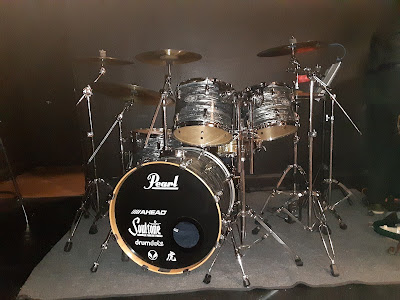Backing Tracks, Performing Live & Cheating Onstage
Rock stars always seem to find a way to make headlines and these days the use of backing tracks seems to be the big topic. From the use of backing tracks behind the band performing live to vocalists lip-syncing their parts to instrumentalists miming their parts onstage. For fans spending hundreds and in some cases, thousands of dollars for tickets alone, this is big deal. So, for whatever reason that a band is either filling in the sound or dare I say, deceiving their audience, we are entitled to an explanation.
Backing Tracks
I have performed with backing tracks several times in multiple bands. In each case it was out of necessity. From the use of sequencers to determined musicians who filled in the space due to missing band members, it was certainly a use what you have approach. Either way, I respected the determination of those in such projects. In each case, the audience didn't seem to care because the backing tracks featured specific instruments and not the vocals and, the band made no attempt to hide the fact that we were using backing tracks.
There are times we see vocalists perform alone onstage with backing tracks and for some reason that doesn't seem to bother anyone. I guess the topic for that discussion is whether or not it is a true live performance. However, the vocalist still might deliver an amazing performance so how many of us would even care at that point? I also don't think many of us care if there are tracks of background vocals or perhaps if the voice on the track is of a deceased performer.
Things change and it's not just the instrumentation onstage. It's also in the way music is sold, the way musicians network, the way musicians buy instruments, as well as how people learn from music teachers. I'll expand on two of these realities.
We also buy instruments now without trying them out first, which I still think is totally crazy. I mean, how can I fall in love with the crack of snare drum without hitting it first? The same would be true when buying something second hand from a private seller. Music stores continue to stock things at a minimum so unless I go to an event like the NAMM Show and try the drum out first hand I have no idea what it sounds like. Be it as it may, this is another change that isn't going anywhere and it isn't going to change any time soon so yes, I have purchased things via mail orders and can only hope for the best, even when I have done my due diligence on the products that I buy.
Opinions vary on the issue and that's fine. All I sought to do with this blog is encourage people to expand the conversation a bit in terms of what a live setting actually is, which I think shows that we don't exactly hold all musicians to the same standard. I also don't think a musical setting should dictate the purity of one's performance. I want people to consider the fact that using a backing track is not in fact a crime. A purist attitude is fine but it doesn't make you a better musician or a better music fan. All that matters is that the music continues to move people and we know that a live performance is in fact a great way to experience any music.
Finally, a personal approach to music is in fact more than a live setting and while some people may not find Master Classes, networking, and in person musical instruction to be as important as a show, I do think we underestimate their value in terms of the impact they have on others. Master Classes give us a very intimate look at an artist in a more instructional setting while also giving us a chance to ask questions ourselves rather than hope that a journalist would do it for us. As far as musical instruction, many of us have had some amazing teachers and it was in fact that personal time we had with them that made all of the difference in the world. However, there was a time when a student may have to travel to see an instructor that did not live close by, which also meant that this personal time with them was at a minimum...until the internet. That is not a bad thing.
Musical genres change, the distribution of music has changed, the way we network for gigs has changed, the way we record music has changed and notice I didn't say whether any of these changes were good or bad. They are simply real and in some cases cheaper and more convenient, and if this is the direction the business is going then so be it, we have to adapt to the situation. The same thing applies to how music is performed. Backing tracks are here to stay and whether the purists like it or not, they are now a part of the business of musical performance. So, if you want to keep working you may have to ask yourself how important your pride is when it comes to paying your bills. Meanwhile, if you're willing to try, you'll find that is also takes great skill to perform with backing tracks and that you create a great performance through the use of backing tracks.

.PNG)



Comments
Post a Comment